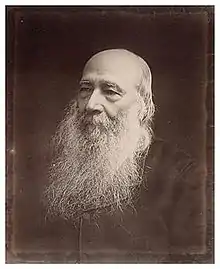Geoffrey Eagar
Geoffrey Eagar (17 December 1818 – 12 September 1891) was an accountant and colonial politician and civil servant in New South Wales, Australia.
Geoffrey Eagar | |
|---|---|
 | |
| Personal details | |
| Born | 17 December 1818 Sydney, New South Wales |
| Died | 12 September 1891 (aged 72) |
Early life
Eagar was born in Sydney, son of Jemima née McDuel and Edward, a lawyer, emancipated convict and merchant.[1] Edward left Australia in 1821, while Geoffrey was still an infant, to take a legal battle over the rights of freed convicts to London, and did not return. His mother Jemima then married William Wentworth, and gave birth to a son. In 1843 he married Mary Ann Bucknell, and the couple had 4 children.[1][2]
Politics
Eagar worked as an accountant at the Bank of New South Wales from 1854 for around five years before resigning to accept an appointment to the New South Wales Legislative Council in September 1859. The following month he was appointed Secretary for Public Works and Representative of the Government in the Legislative Council in the Forster ministry, serving until the ministry's defeat in March 1860. He resigned from the Council in November 1860,[3][4] to contest the election for The Glebe, but he finished a distant 3rd.[5]
He was elected to the Legislative Assembly at the by-election in January 1863 for the seat of West Sydney.[6] He was appointed Colonial Treasurer in the first Martin ministry in October 1863.[3] He lost his seat at the 1864 election for West Sydney,[6] and was unsuccessful at election for the Paterson.[7] He was returned to the Legislative Assembly at the West Sydney by-election in July 1865,[6] and in January 1866 was appointed Colonial Treasurer in the second Martin ministry, serving until the resignation of the ministry in October 1868.[3] Eagar lost his seat again at the 1869 election for West Sydney,[6] and was unsuccessful at the Hastings,[8] and Goldfields West.[9]
Later life
After leaving parliament he was appointed head of the New South Wales Treasury from 1872,[2][3] until his retirement in February 1891.[10]
Eagar died at his home in the Sydney suburb of Glebe Point, survived by his wife and three of their four children, Arthur, a bank manager, Ernest a civil servant and a daughter.[10][11] He also had a house in the Blue Mountains, opposite Eagar's Platform, now called Valley Heights railway station.[1]
References
- Lamb, P N (1972). "Eagar, Geoffrey (1818-1891)". Australian Dictionary of Biography. Melbourne University Press. ISSN 1833-7538. Retrieved 16 January 2021 – via National Centre of Biography, Australian National University.
- "Geoffrey Eagar (1818-1891)". NSW Parliamentarians, biographical notes. State Library of New South Wales. Retrieved 16 January 2021.
- "Mr Geoffrey Eagar (1818-1891)". Former Members of the Parliament of New South Wales. Retrieved 1 May 2019.
- Mennell, Philip (1892). . The Dictionary of Australasian Biography. London: Hutchinson & Co – via Wikisource.
- Green, Antony. "1860 The Glebe". New South Wales Election Results 1856-2007. Parliament of New South Wales. Retrieved 16 January 2021.
- Green, Antony. "Elections for the District of West Sydney". New South Wales Election Results 1856-2007. Parliament of New South Wales. Retrieved 16 January 2021.
- Green, Antony. "1864 The Paterson". New South Wales Election Results 1856-2007. Parliament of New South Wales. Retrieved 16 January 2021.
- Green, Antony. "1869 The Hastings". New South Wales Election Results 1856-2007. Parliament of New South Wales. Retrieved 16 January 2021.
- Green, Antony. "1870 Goldfields West". New South Wales Election Results 1856-2007. Parliament of New South Wales. Retrieved 16 January 2021.
- "Death of the Hon. Geoffrey Eagar". The Sydney Morning Herald. 14 September 1891. p. 5. Retrieved 17 January 2021 – via Trove.
- "Death of Mr Geoffrey Eagar". The Daily Telegraph. 14 September 1891. p. 4. Retrieved 17 January 2021 – via Trove.
| Political offices | ||
|---|---|---|
| Preceded by John Dickson |
Representative of the Government in the Legislative Council 1859 – 1860 |
Succeeded by John Hargrave |
| Preceded by Edward Flood |
Secretary for Public Works 1859 – 1860 |
Succeeded by William Arnold |
| Preceded by Thomas Smart |
Colonial Treasurer 1863 – 1865 |
Succeeded by Thomas Smart |
| Preceded by Marshall Burdekin |
Colonial Treasurer 1866 – 1868 |
Succeeded by Saul Samuel |
| New South Wales Legislative Assembly | ||
| Preceded by William Charles Windeyer |
Member for West Sydney 1863 – 1864 Served alongside: Lang, Dalgleish, Love |
Succeeded by John Darvall |
| Preceded by John Darvall |
Member for West Sydney 1864 – 1869 Served alongside: Lang, Robertson/Windeyer, Joseph/Campbell |
Succeeded by John Robertson |
| Government offices | ||
| Preceded by Henry Lane |
Under Secretary for Finance and Trade 1872 – 1891 |
Succeeded by Francis Kirkpatrick |